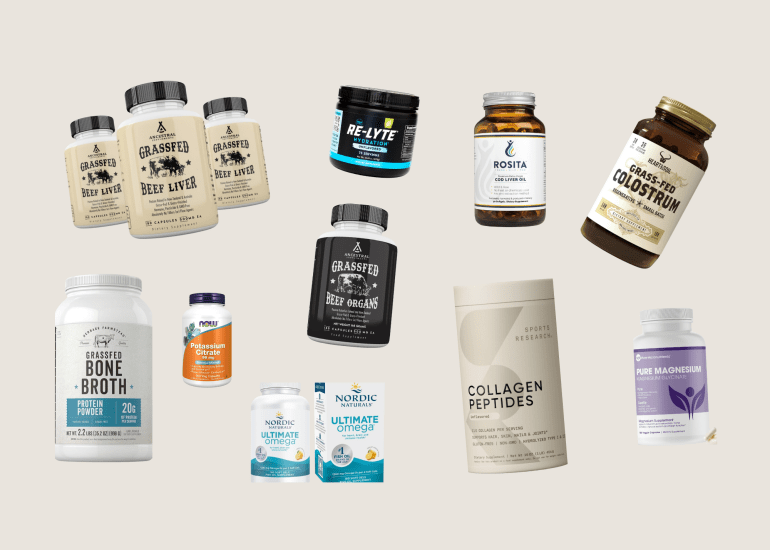Are you considering the carnivore diet or already following this meat-based lifestyle? Wondering what supplements might be necessary to support your health? The carnivore diet focuses on nutrient-dense foods like muscle meats, organ meats, seafood, eggs, and dairy. When followed correctly, it can provide most of your essential nutrients. However, some deficiencies may arise, particularly during the transition phase or if your food choices lack variety. This guide explores the most beneficial supplements to take on a carnivore diet, how to identify nutrient deficiencies, and how to optimise your health for long-term success.
Should You Take Supplements on a Carnivore Diet
Although the carnivore diet emphasises whole, nutrient-rich animal-based foods, there are instances where supplements can play a critical role. These situations often include the transition phase, individual health conditions, or dietary gaps due to limited food variety. Proper supplementation ensures you maintain electrolyte balance, support your immune system, and optimise nutrient absorption.
What Supplements Should You Take on a Carnivore Diet?
While the carnivore diet is naturally rich in many nutrients, certain supplements can help address gaps or provide support during the transition phase. Below are the most commonly recommended supplements for optimal health.
1. Electrolyte Supplements for Balance
Why They Matter: Electrolyte imbalances are common during the initial stages of the carnivore diet, particularly as your body sheds excess water weight. Symptoms like fatigue, muscle cramps, and headaches are often due to low levels of sodium, magnesium, or potassium.
What to Take:
- Sodium: Add unrefined sea salt (e.g., Celtic Sea Salt or REDMOND Real Salt) to meals.
- Magnesium: Use magnesium glycinate or citrate (e.g., Pure Encapsulations Magnesium Glycinate).
- Potassium: If dietary intake is insufficient, consider potassium citrate supplements (e.g., NOW Potassium Citrate).
2. Organ Supplements for Essential Nutrients
Why They Matter: Organ meats are nutritional powerhouses, offering vitamins and minerals such as vitamin A, B12, iron, and copper. If you’re not consuming organ meats regularly, organ supplements can fill the gap.
Recommended Products:
- Ancestral Supplements Desiccated Liver
- Heart & Soil Grass-Fed Bone Marrow & Liver Supplement
- Ancestral Supplements Grass Fed Beef Organ Supplement
3. Vitamin D3 Supplements for Immune Health
Why It’s Essential: Even with a nutrient-dense carnivore diet, many people lack adequate vitamin D, particularly if they have limited sun exposure. Vitamin D supports immune function, bone health, and mood regulation.
Dosage: 2,000–5,000 IU daily or as directed by your healthcare provider.
4. Omega-3 Fatty Acid Supplements for Heart Health
Why They’re Important: While fatty meats and seafood provide omega-3s, many individuals fall short of optimal intake. Balancing your omega-6 to omega-3 ratio is crucial for cardiovascular and cognitive health.
Recommended Products:
5. Collagen Supplements for Joint and Skin Health
Why It’s Essential:
Collagen is a structural protein that supports skin elasticity, joint function, and gut health. While the carnivore diet includes natural collagen sources like bone broth, supplementation provides an additional, convenient way to ensure optimal intake, particularly for active individuals or those seeking enhanced recovery and skin benefits.
Recommended Products:
6. Colostrum Supplements for Immune and Gut Support
Why It Matters:
Colostrum, rich in growth factors and immunoglobulins, enhances gut integrity, strengthens immunity, and supports athletic performance. It is especially beneficial during the carnivore diet’s transition phase, helping to ease digestive adjustments and fortify the immune system.
Recommended Products:
By incorporating these supplements into your carnivore lifestyle, you can bolster specific health areas while complementing the nutrient-dense foundation of your diet.
How to Optimise Your Carnivore Diet Without Supplements
While supplements can fill gaps, prioritizing a nutrient-dense diet is key to long-term health on the carnivore diet. Focus on the following food groups to maximize your nutrient intake:
- Muscle Meats: Beef, lamb, pork, and poultry for protein, iron, and zinc.
- Seafood: Salmon, mackerel, sardines, and shellfish for omega-3s and iodine.
- Organ Meats: Liver, heart, and kidney for concentrated nutrients.
- Eggs and Dairy: Rich in fat-soluble vitamins, calcium, and protein (if tolerated).
Incorporating variety and quality into your meals reduces the need for excessive supplementation.
Frequently Asked Questions
1. Are supplements necessary on a carnivore diet?
Not always. A properly planned carnivore diet can meet most nutritional needs. However, targeted supplements may help address deficiencies or support specific health goals.
2. How do I know which supplements to take?
Blood tests can identify deficiencies and guide your supplementation decisions. Testing ensures you’re addressing your unique needs.
3. Are organ supplements as effective as eating organ meats?
While organ supplements are a convenient alternative, fresh organ meats often provide better nutrient bioavailability.
4. How can I prevent electrolyte imbalances on a carnivore diet?
Stay hydrated, use mineral-rich salts, and consider magnesium or potassium supplements, especially during the transition phase.
5. Should I take vitamin D supplements even if I follow a nutrient-dense carnivore diet?
Testing your levels is important. If your vitamin D is low, supplementation may be necessary to reach optimal levels.
Final Thoughts
The carnivore diet offers a unique approach to nutrition that can meet most of your dietary needs when done correctly. However, targeted supplements can fill gaps, ease the transition, and support overall health. Start by testing for deficiencies, incorporate high-quality supplements, and focus on variety in your diet for long-term success.
Further Reading:
- Carnivore Diet: Benefits and Risks – Healthline
- Vitamin D and Health – NHS
- Electrolytes in Diet – PubMed
- NHS Guide to Vitamin D
If you want to learn more about the carnivore diet, check out the eBook, Carnivore Diet for Beginners: Transform Your Health with Meat-Based Nutrition.
*This article contains affiliate links. If you click on these links and make a purchase, I may earn a commission at no additional cost to you.

